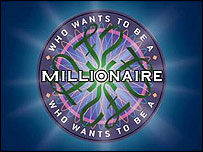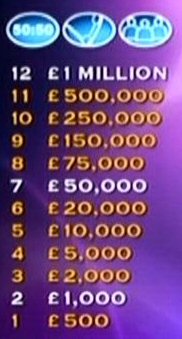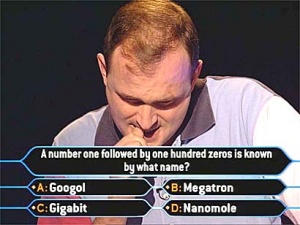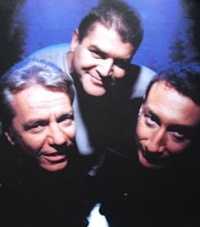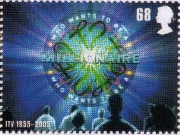Who Wants to be a Millionaire?
Contents |
Host
Chris Tarrant (1998-2014)
Jeremy Clarkson (2018-)
Broadcast
Celador for ITV, 4 September 1998 to 28 July 2007 (477 episodes)
Co-produced by Carlton, 1998
2waytraffic for ITV, 18 August 2007 to 2 April 2011 (88 episodes)
Victory Television for ITV, 15 July 2011 to 11 February 2014 (27 episodes)
Stellify Media for ITV, 5 May 2018 to present
Synopsis
Well, it had to happen at some stage, but perhaps even we didn't expect this go-for-the-throat show to be such a huge success. The previous unconvincing "let's raise the stakes" show, Raise the Roof, was still fairly fresh in the memory, and this new show might have been just the same but with an extra "0" on the end of the budget. Thankfully, not so.
The timing
However, there were a few things that were intriguing before the programme was even broadcast which made things look distinctly promising. The major clue that something special was on its way was that ITV was clearing some cupboard space for this baby. The idea was that the programme would appear at roughly the same time every night for 12 consecutive days, bulldozing through whatever scheduled episode of Inspector Wexford or The Bill was supposed to appear there instead. Good grief, even the ITV golden goose of Coronation Street was once rescheduled because of it!
The rules
Ten contestants from around the UK take part in each programme. From the ten qualifiers, one contestant is chosen via a timed question. This contestant plays for the £1,000,000 top prize.
The contestant must answer 15 multiple-choice questions correctly in a row to win the jackpot. The contestant may quit at any time and keep their earnings. For each question, they are shown the question and four possible answers in advance before deciding whether to play on or not. If they do decide to offer an answer, it must be correct to stay in the game.
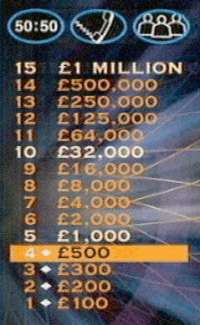 The money tree. Currently, this contestant is at £500. Answering the next question correctly earns them a guaranteed £1,000 - no matter what happens thereafter.
The money tree. Currently, this contestant is at £500. Answering the next question correctly earns them a guaranteed £1,000 - no matter what happens thereafter.If at any stage they answer incorrectly, they fall back to the last "guarantee point" - either £1,000 or £32,000 - and their game is over. For example, a contestant failing on question 13 would win £32,000. Answering incorrectly before reaching the first guarantee point (£1,000) loses everything. A new player is picked from the remaining pool of 10. If time runs out on a particular programme, the next programme continues that player's game.
When the money starts getting really serious (£32,000 and over), the host will reach for the appropriate cheque and sign it. Whilst this is mainly used as a theatrical device, the cheques can be cashed in by the contestants for real.
Lifelines
At any point, the contestant may use up one (or more) of their three "lifelines". These are:
- 50:50 - two of the three incorrect answers are removed. Originally, these answers were chosen in advance by the question-setters (and so would invariably be the two you knew it couldn't be), but this was later changed to a random selection.
- Phone-A-friend - the contestants may speak to a friend or relative on the phone for 30 seconds to discuss the question.
- Ask the audience - the audience votes with their keypads on their choice of answer.
Each lifeline may only be used once during a contestant's entire game.
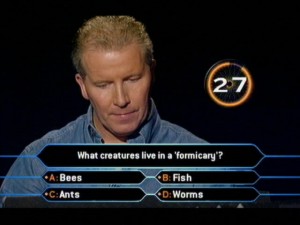 A Phone-A-Friend in progress.
A Phone-A-Friend in progress.The host
Chris Tarrant (pictured) is one of those game show hosts whose job it is not just to get up your nose, but to tickle your nostrils and play with the nasal hairs while he's in there. He has perfected the art of getting people to scream "WILL YOU JUST DAMN WELL GET ON WITH IT!" at the radio through his years of running promotional games on Capital FM (his 9-to-5 job is a disc jockey - shouldn't that be 6-to-10 job?)
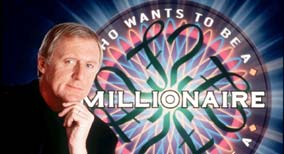 Millionaire maker, Chris Tarrant.
Millionaire maker, Chris Tarrant.While Who Wants... was a very simple idea, it needed a good host to carry it off and Tarrant was that host. For example, if the producers had plumped for Richard Madeley, Les Dennis or even Brucie it's almost certain that the ITV audience wouldn't have been anywhere as captivated.
Tarrant's style was essentially his usual zany/wacky persona, but unusually in this game, he showed that he could be professional and accurate when the need arose (e.g. when reading out the initial qualification question, where the time of response was critical). Yes, he was annoying when he took about a minute before telling the contestant that they had now won "...X THOUSAND POUNDS!!!", but that's the point - no-one else in the business could have built up this suspense. He made you care.
Marks for style and technical merit
Putting the easy-to-pick-up format and the host aside for one moment, it's clear that some T.L.C. went into the making of the show. In fact, the whole theme of the programme seemed to take the essential classic elements of a quiz but present them using modern metaphors. For example, the synthesizer fanfare theme music was dramatic, but if you listened closely you could make out more than a passing semblance of the actual famous "Who Wants to be a Millionaire?" song - so famous, we can't remember what film it appears in. [High Society - Ed.] There was even some extremely nice Pet Shop Boysesque background music while the contestants pondered about the questions, with deep, gothic-sounding choirs intermixed with high-pitched electronic arpeggios. The entire musical score is even available on CD (see Merchandise below).
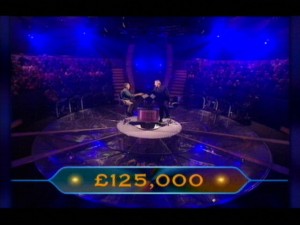 The famous Who Wants to be a Millionaire? set, based in Elstree, London.
The famous Who Wants to be a Millionaire? set, based in Elstree, London.The set is one of those "in the round" numbers. Perhaps not the most original idea in recent times, but it's so nicely constructed (with its suspended Perspex floor with a huge dish-shaped underneath covered in mirror paper) you could tell Terence Conran would approve.
The lighting also deserves a passing mention, with the spotlights zooming down on the contestant after each major question answered. Even the logo is smartly and wittily executed, mixing the traditional intricate bank note patterns with question marks and pound signs.
The first millionaire
After 122 programmes, Judith Keppel became the first person to answer all 15 questions correctly in the original UK version of the show. Allegations of a fix (unsubstantiated, to our eyes) raged in the newspapers because the episode happened to coincide with the final ever episode of the popular situation comedy One Foot in the Grave on rival channel BBC 1.
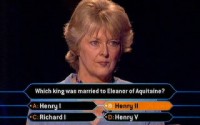
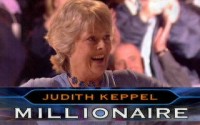 Judith Keppel becomes £1,000,000 richer
Judith Keppel becomes £1,000,000 richerThe question Judith answered to win the money was:
Which king was married to Eleanor of Aquitaine?
A: Henry I
B: Henry II
C: Richard I
D: Henry V
Judith correctly answered B. Because of the pound's exchange rate, her win was the highest ever win on the quiz show anywhere in the world.
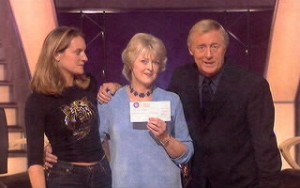
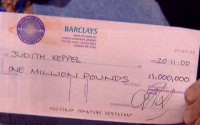 Judith holds her cheque with her daughter (left) and Tarrant (right).
Judith holds her cheque with her daughter (left) and Tarrant (right).Despite the big win, there's no doubt Chris Evans spoiled the party a little by beating Tarrant to giving away £1,000,000 on air. His Channel 4 TFI Friday entertainment show gave away £1,000,000 in a spoiler slot during December 1999 called Someone's GOING to be a Millionaire (subtle, no?), which wasn't a patch on the real Millionaire except in one regard - namely, there was a guaranteed payout.
Millionaire has opened many doors for British TV producers. With this show now signed up to over 100 countries, there's no doubt that the world will be watching the television emanating from this fair land more closely in the future.
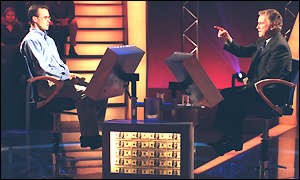 Regis Philbin (right), host of the US version, tells John Carpenter (left) that he is the first millionaire of the US series.
Regis Philbin (right), host of the US version, tells John Carpenter (left) that he is the first millionaire of the US series.A new beginning or the beginning of the end?
On 18 August 2007, Chris Tarrant's world turned upside down as the format - one of the few things that hasn't changed in all these years - was altered significantly. The first three easy peasy questions were gone and a new - decidedly odd - money ladder was put in place: £500, £1,000, £2,000, £5,000, £10,000, £20,000, £50,000, £75,000, £150,000, £250,000, £500,000, £1,000,000. The theme music was seemingly remixed for a nightclub, though gone is the gold standard think music to be replaced by some decidedly average bangs and thumps. The new titles were welcome, the new question graphics are OK but gone is Mark van Bronkhorst's lovely Conduit font to be replaced by, of all things, Verdana. Truly this is a Millionaire for the Microsoft Powerpoint generation.
From 3 August 2010, more changes were introduced to the format, starting with the scrapping of the "Fastest Finger First" round. Instead, contestants were chosen through an off-screen audition process. During the game, if a player reaches the £50,000 level, a new lifeline becomes available to them called "Switch", which allows them to swap a question they were unsure of for a different one worth the same amount of money. Perhaps the biggest change was the introduction of a time limit on questions. Contestants are now given 15 seconds to answer questions up to the £1,000 level and 30 seconds to answer questions up to the £50,000 level, but the last five questions are not timed. The clock temporarily stops when a lifeline is being used. When the time runs out, the contestant is treated the same as having given an incorrect answer and drops back to the last safe haven.
For ten years, Who Wants to be a Millionaire had been either the brightest light on ITV's schedule or a reliable banker to bring in the viewers. By now, it was clear that it was no longer a significant draw, and ITV allowed us to think that they were only keeping the show alive for contractual reasons. The public was phased out and only celebrities participated; a few "The People Play" specials made the new priorities sharply clear. Half of the celebrity prize fund was diverted from charity to a premium-rate phone-in question, and live episodes came to a hurried and abrupt end.
There was no tremendous surprise when we heard in October 2013 that Chris Tarrant was leaving the show. The producers decided that he was an impossible act to follow, and the programme came to a conclusion in February 2014. For a bit.
20th Anniversary
ITV announced that there will be a special 7-episode revived series broadcast from May 2018 with Jeremy Clarkson as the new host, to commemorate the 20th anniversary of the programme. The show returned to the 15 question format, with Ask The Host being introduced as a new lifeline, allowing the contestants to ask Clarkson for guidance on a question. Contestants are now also able to set their own second safety net amount anywhere from £2,000 to £500,000 before they see the question, which saved ITV a lot of money in the first series as people were a little too brave; many episodes in the first series ended with four-figure total payouts despite the brisker pace (presumably designed to match the pace at which Challenge airs them). However, we do miss Chris' extended reveals, which Clarkson simply does not do, and bizarrely so, since he's proved himself quite capable of extended reveals in the Star in a Reasonably Priced Car segment of Top Gear. (Mind you, towards the end of the run, Chris seemingly lost interest in them as well…)
Key moments
When Judith Keppel won the £1,000,000 jackpot, the pyrotechnics man (who'd been sitting in on every show since the beginning of the series), whose job it was to set off the foil streamers, pressed the button and... nothing happened. This is despite several rehearsals that the director had carried out in previous weeks and months to ensure everything went smoothly when the big day came along. So instead they tried again (successfully) at the end of the programme.
One of the show's most memorable episodes came in January 1999 when two contestants won £125,000 on the same show. Martin Skillings, a quantity surveyor from Brancaster, became the first person ever to break the £100,000 barrier, only for Ian Horswell - the very next contestant - to repeat the feat around 40 minutes later. This produced a world record at the time for the most money given away to one contestant on a game show. It also produced the world record for the most money given away in a single episode (£266,000).
On the show after Judith Keppel's £1,000,000 win, the Fastest Finger First question was "Starting with ‘Stop’, put the traffic light sequence in order according to the British Highway Code." It turned out that none of the contestants got the right answer. Another question was played instead about Roman Numerals, to which the contestants further demonstrated their thickness in that only one got it right!
Not one of the show's highest winners in terms of money, but certainly one of the most effervescent was Fiona Wheeler, famous for her wish to bathe in a bath of chocolate (something she later did do in a TV Times photoshoot). The question that won her £32,000 (What is the everyday name for the trachea?) was a gift - she happened to be a fan of the medical drama series Casualty.
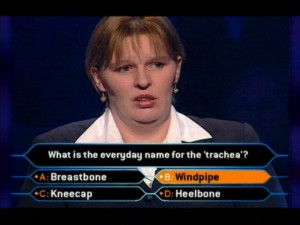 Fiona Wheeler.
Fiona Wheeler.On the episode aired on 8 March 1999, Tony Kennedy, a warehouseman from Blackpool, was asked the following question for £64,000:
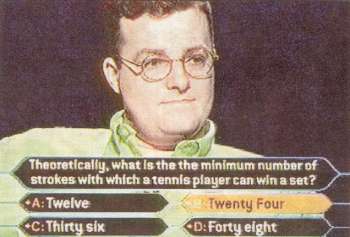 After some deliberation, Tony decides he will play. He offers the answer B, which is locked away into the computer.
After some deliberation, Tony decides he will play. He offers the answer B, which is locked away into the computer.The computer told Chris Tarrant that the correct answer was indeed B, and Tony also went on to win £125,000 by answering the next question correctly.
However, minutes later viewers began ringing ITV and the newspapers to complain. It turns out that the answer to the question is A (12). This is because you could serve 12 aces to win games one, three and five, then your opponent could double-fault 12 times, so you win games two, four and six without hitting a shot and hence win the set after 12 shots.
This blunder made front-page news, and the next day an apology was broadcast. Tony was allowed to keep his money.
 "FAULT!" ran the front-page headline of the Daily Mirror the next day. Incidentally, the Mirror is the arch-rival of the Sun, the newspaper sponsoring the programme at the time.
"FAULT!" ran the front-page headline of the Daily Mirror the next day. Incidentally, the Mirror is the arch-rival of the Sun, the newspaper sponsoring the programme at the time.There was a comedy moment on 12 April 2001 when contestant Richard Deeley, on receiving the £32,000 cheque, scrunched it up and threw it across the studio - before having to pick it up off the floor when he got the £64,000 question wrong. Richard subsequently claimed that he had intended his throwing away of the cheque as a joke, inspired by Chris Tarrant's "But we don't want to give you that!" and simultaneous snatching away of cheques.
On a Valentine's Day celebrity special shown on (er...) 11 February 2006, Laurence and Jackie Llewelyn-Bowen (playing for the Shooting Star Children's Hospice) reached the £1,000,000 question. They were asked: "Translated from the Latin, what is the motto of the United States?" They went for "In God We Trust", and in so doing lost their charity a stonking £468,000 - the correct answer being "One Out of Many", from the Latin "E Pluribus Unum". However! The question was subsequently deemed ambiguous, since (1) "In God We Trust", while not taken from any Latin source, has been the official motto of the US since 1956, and (2) "E Pluribus Unum", despite featuring on the Great Seal of the US since the seal's creation in 1782, was never codified by law and was only a de facto motto until 1956. So, for purposes of fairness, Laurence and Jackie were given another £1,000,000 question ("Who was the first man to travel into space twice?"), which they did not attempt to answer, leaving with £500,000. The oddest thing about the whole affair was that the ambiguous question was broadcast, despite the fact that the problems with it had come to light some weeks before the episode was due to be transmitted. (Of note, too, is that the question was broadcast with the losing cue for £16,000 and £500,000 instead of the actual losing cue for £1,000,000, a lower-key arrangement of the show's familiar eight-note fanfare - as of the end of 2024, this cue is still to be broadcast on the UK version of the show.)
One participant, Charles Ingram, had to be edited out of an episode due to be broadcast on 18 September 2001 after being accused and later convicted of conspiracy to obtain a valuable security by deception; the previous episode, broadcast 15 September, was extended last-minute by twenty minutes, through the weekend's news bulletin, and resulted in a film being cancelled. His footage would later be broadcast on ITV2 following a Tonight documentary which set out the evidence against him and his accomplices on 21 April 2003.
On a celebrity edition in 2007, Rick Parfitt and Francis Rossi from Status Quo said there were two knights on a chessboard when the correct answer is four. However, the game was restarted when producers claimed that the question had been used on the programme before. (That personal mates of Chris Tarrant had bombed out on question one had nothing to do with it, presumably.) They went on to win £50,000 for their chosen charity, the Music Foundation.
One contestant was asked the question "What was the middle name of playwright Richard Sheridan?" The contestant gave the answer Butler, which was deemed incorrect (with the correct answer being Brinsley). However, it turned out that Butler was, in fact, Sheridan's second middle name, and so the contestant was invited back a few weeks later.
Another contestant was asked the question "Which mythical person shares their name with a type of insect?". The contestant gave the answer Goliath (which was correctly accepted) - however, one of the other choices was Hercules (which is also correct).
Of note during the Clarkson era was his open contempt for the commercial breaks - having presented exclusively for the BBC for thirty years, he had never needed to throw to them - which he typically introduced facetiously. "And now we must know what goods and services are available in the modern world" was one such barb.
During Clarkson's reign, a contestant named Maria accidentally, yet hilariously, gave away a behind-the-scenes secret when the end of show klaxon sounded during her game. When asked, 'You know what that means, don't you?', she replied that she had to go and get changed, much to her visible embarrassment and the audience's amusement. Even Jeremy himself couldn't help but laugh as he tried to maintain the illusion to the audience at home, despite agreeing with her and saying 'I'll see you in an hour's time!'.
Catchphrases
"Is that your final answer?"
"...but we don't want to give you that!"
"Or you could ask the audience... who are nearly always right"
"Here's what I think" - used by Jeremy Clarkson when a contestant asks to use the "Ask The Host" lifeline. He would often end his thought process by saying: And that's my final answer.
Inventor
The format was devised by David Briggs, who also devised many of the promotional games for Chris Tarrant's breakfast show on London radio station Capital FM, along with comedy writers Mike Whitehill and Steven Knight. The same team also brought us Talking Telephone Numbers, Winning Lines and The People Versus. The Fastest Finger First round bears a remarkable similarity to a round from a much earlier Celador/Tarrant show, Everybody's Equal.
Theme music
The much-lauded music, which runs almost continuously throughout the whole show, was written by Keith and Matthew Strachan in ten days after it was decided that the music in the pilot show (composed by Pete Waterman) wasn't good enough.
The 'Time's Up' cue is a French horn glissando played by three French horns. So now you know. There are over 100 other different music cues.
The 2007 rave-alike remix was done by Ramon Covalo.
Trivia
The lifelines were originally going to be called "helping hands".
The original promotional trailer featured a fake game show called "Win a Wok", with Chris Tarrant in the foreground explaining the show's concept. He also said, "you can phone a friend, ask the audience or even ask me for help". However, asking the host for help wouldn't develop into the show's rules until Clarkson took over.
In the first series, if anybody was struggling in the early questions Chris would give a clue to the answer for the contestant to save their lifelines such as "I don't know but B looks good". This also indicated that Chris saw the answer when the question appeared. This led to future shows saying the answer won't appear on his screen until the contestant says "final answer", thus forcing the contestant to use their lifelines early.
Originally, the money tree involved 20 questions ranging from £10 to £5,242,880 (2^19 x 10). They also considered structures for £25 to £13,107,200 and £100 to £52,428,800. However, later audience research showed that people liked the concept of being a "millionaire" most and so the top prize was actually reduced.
Later on, during the format development, the intended idea was for the contestants to start at £1 and answer 21 questions. However, ITV entertainment boss Claudia Rosencrantz through that idea was too boring so they started at £100 in the final format.
When Chris Tarrant hosted the Capital breakfast radio show, he was commuting between central London, the WWTBAM studio in Wembley (or Elstree) and his home in Surrey. As such, he'd only get a few hours of sleep a day. He had a second bedroom in the studio so he can get some kip before rehearsals.
WWTBAM is the only UK game show to have been honoured with a postage stamp. It is one of six ITV programmes featured in a set issued in September 2005 to mark ITV's 50th birthday.
Via the US version, Who Wants to be a Millionaire? producer Paul Smith (no relation to the fashion designer) brought such good ratings to the otherwise flagging ABC channel that it was said he was held in such high esteem in the Disney-owned network that he was second only to Mickey Mouse.
If you go to Disney-MGM Studios in Florida, you could (until 2006) play Who Wants to be a Millionaire? live in a mock studio for a chance to win a cruise - and anyone can win! The youngest person ever in the chair was two years old.
Up to and including 21 June 2013, 30 series and 588 episodes have been transmitted.
In the first 25 series, 1178 people have sat in the hot seat, winning a total of £50,762,000 - an average of £43,091 each.
There have also been 270 celebrities competing, winning a total of £6,431,000 for charity.
Nine celebrity contestants have played both the 15 and 12 question formats within the show's history. Eamonn Holmes (with Sir Alex Ferguson in 2004 and Kay Burley in 2007), Piers Morgan (with Ann Widdecombe in 2006 and Emily Maitlis in 2007), Judith Chalmers (with £1 Million winner Robert Brydges in 2003 and her son Mark Durden-Smith in 2008), Penny Smith (with Andrew Castle in 2004 and Anneka Rice in 2009), Jo Brand (with Ricky Tomlinson in 2004 and Nick Hancock in 2009), Andrew Lancel (with Kika Mirylees in the 2004 Cops and Robbers special and Gary Lucy in 2009), Angela Rippon (with Dermot Murnaghan in 2004 and Martin Lewis in 2009), Sir Terry Wogan (with Tim Radford in 2005 and Chris Evans in 2009) and Gabby Logan (with Ally McCoist in 2002 and Katherine Jenkins in 2010).
Olympic rower Sir Steve Redgrave and wife Lady Ann Redgrave originally appeared on a celebrity edition in 2001 but failed to win Fastest Finger First on three attempts. They finally managed to reach the hot seat, six years later, winning £1,000. This also happened to Emma Forbes. She appeared on the same celebrity special in 2001 (with her father and actor Bryan Forbes), also failing to win Fastest Finger First. Emma managed to reach the hot seat in 2010 with Andi Peters.
In rehearsals, Sir Terry Wogan and Chris Evans managed to reach £1,000,000 but ending up winning £1,000 (losing £4,000) on the actual recording.
There have been six £1,000,000 winners – Judith Keppel, a garden designer from Fulham on 20 November 2000; David Edwards, a teacher from Staffordshire on 21 April 2001; Robert Brydges, a banker from London on 29 September 2001; Pat Gibson, a software developer from Wigan on 24 April 2004; Ingram Wilcox, a civil servant from Bath on 23 September 2006; and Donald Fear, a teacher from Telford on 11 September 2020.
The most money lost on the show - and also the greatest loss on a UK game show - was £218,000, by Duncan Bickley on 21 October 2000 when he got the £500,000 question wrong and left with £32,000. On 1 November 2003, Rob Mitchell took the same gamble and also lost £218,000.
Nine people have had a look at the £1,000,000 question and decided to leave with £500,000 – Peter Lee on 19 January 2000, Kate Heusser on 2 November 2000, Jon Randall on 27 November 2000, Steve Devlin on 20 January 2001, Mike Pomfry on 12 March 2001, Peter Spyrides on 16 October 2001, Roger Walker on 26 February 2002, John Robinson on 4 March 2019 and Davyth Fear on 1 September 2019.
Ten contestants have left with no money at all – John Davidson on 10 January 1999, David Snaith on 5 March 1999, Michelle Simmonds on 17 February 2001, Peter and Valiene Tungate on a couples show on 26 March 2001, Martin Baudrey on the live 300th programme on 30 November 2002, Emma North on 28 December 2002, Bill Copland on 3 April 2004, Dave Scholefield on 29 January 2005, Harry Redknapp on 19 November 2021 and Fastest Finger First winner John McKenna on 10 September 2022. The 10 September 2022 was notable for airing entirely without adverts, even going so far as having a call-and-lose contest expunged (as evidenced by it remaining in the subtitles file), as a result of the death of Queen Elizabeth II.
The highest ratings were recorded on 7 March 1999 when 19.2m people tuned in to watch the unfolding drama.
The show's format has been licensed or optioned to 109 countries. The 100th country to go on air was Kenya. An unexpected spin-off from the international success of the format was that the Indian version inspired an award-winning novel (Q & A by Vika Swarup) which in turn spawned the BAFTA-winning, Oscar-winning, everything-winning hit movie Slumdog Millionaire.
For a show that was a mainstay of ITV's schedules for a decade, there were surprisingly few spin-off programmes. A behind-the-scenes documentary, Is That Your Final Answer?, went out on Christmas Eve 1999, and there was a retrospective edition, Chris Tarrant's Final Answer on 11 February 2014, a week after the main series ended. An edition of the Tonight programme on 21 April 2003 set out the evidence that convicted the Ingrams and Whittock, as did Quiz, a 2020 drama. Another 2020 series, The Million Pound Question, was an around-the-houses look at the six million pound wins.
Repeats of Millionaire aired in a 5pm slot during the summers of 2003 and 2004, initially topped and tailed by short pieces from Chris Tarrant. Repeats are also sold to the Challenge channel and have consistently been amongst the most popular shows on that network.
A special live edition marked its 300th show, where Ask the Audience became Ask the Nation, and over 250,000 phone calls were received in less than two minutes.
The Who Wants to be a Millionaire? board game sold more than 1,000,000 units during the first two years on the market.
Not only has the show been voted one of the top five game shows not once but twice by the esteemed readers of this very site, it was also named the nation's favourite game show in a 2008 survey for Churchill Insurance, and again in 2009.
During Tarrant's reign - or at least, the part of his reign before it was done away with - Fastest Finger First was tackled by ten contestants. Clarkson's tenure, well it was all a bit half-hearted really, Arial font-face money ladder, incorrect cue usage. They could only bring themselves to hire six contestants, rather than ten. Spare a thought then for the poor chap on the episode dated 15 September 2019, Mehboob Lakhany, where a particularly inept set of contestants meant that all five of the other contestants got a turn in the hot seat. We believe this is the highest turnover of contestants on any edition of the show.
Ignoring the first programme's Graham Elwell and Rachel da Costa, who posted Fastest Finger First times of 0.69 seconds but had the advantage of only having to press one button, the fastest time on any UK edition was by Michelle Brook on 8 October 2022, with 0.74 seconds. If you don't count her either, on the grounds that she was at an advantage (her episode featured a visually impaired contestant, and as such all the answers were read out before the noise), the next fastest was Jonathan Pash on 6 May 2008, with 0.97 seconds.
Merchandise
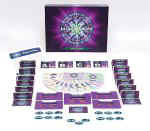 WWTBAM - Edition II Board game
WWTBAM - Edition II Board game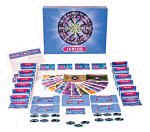 WWTBAM Junior Board game
WWTBAM Junior Board game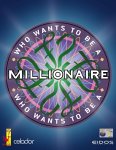 WWTBAM computer game
WWTBAM computer game WWTBAM computer game - 2nd edition
WWTBAM computer game - 2nd edition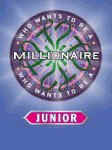 WWTBAM computer game - Junior edition
WWTBAM computer game - Junior edition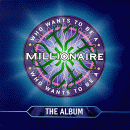 The UK Soundtrack album The complete music score for the show on CD
The UK Soundtrack album The complete music score for the show on CD WWTBAM Quiz books
WWTBAM Quiz books Behind the Scenes at "Who Wants to be a Millionaire?" Book by Tom McGregor
Behind the Scenes at "Who Wants to be a Millionaire?" Book by Tom McGregor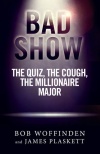 Bad Show Book by Bob Woffinden and James Plaskett, about the Ingram conviction
Bad Show Book by Bob Woffinden and James Plaskett, about the Ingram conviction(and Weaver's Week review)
Web links
Off the Telly review from September 1999.
The show publicised the hashtag #millionaire.
Pictures
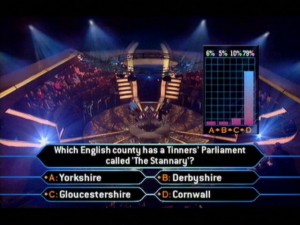 After an Ask the Audience lifeline, the crowd seem pretty sure the answer is D.
After an Ask the Audience lifeline, the crowd seem pretty sure the answer is D.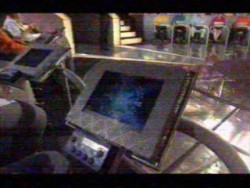 The screens and keypads used for the Fastest Finger First round.
The screens and keypads used for the Fastest Finger First round.See also
Weaver's Week obituary (2013)

